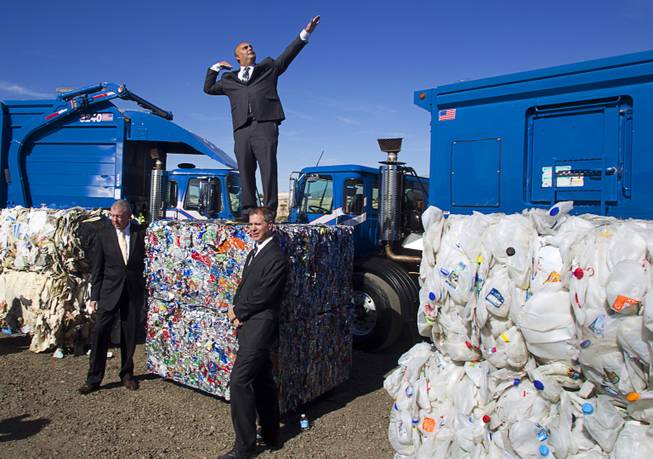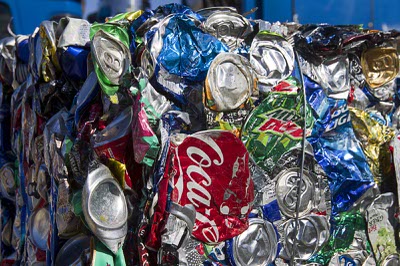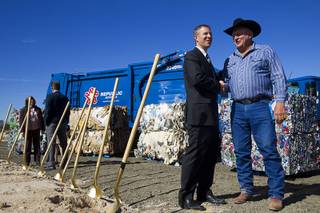
Len Christopher, general manager of Republic Services’ recycling division poses on a bale of aluminum cans during a groundbreaking ceremony for the Republic Services’ Southern Nevada Recycling Complex at the northeast corner of Cheyenne Avenue and Commerce Street in North Las Vegas Thursday, November 6, 2014. With Christopher are Bob Coyle, left, vice president of governmental affairs, and Tim Oudman, Republic Services area president.
Published Thursday, Nov. 6, 2014 | 10:02 a.m.
Updated Thursday, Nov. 6, 2014 | 6 p.m.
One of the challenges in building momentum for recycling in Southern Nevada has been a chokepoint at the receiving end of all those milk cartons, pizza boxes and soda cans.
The recycling facility operated by Republic Services, the waste management company that handles the valley’s residential customers, isn’t large enough to handle all of the recyclables left curbside on residential routes equipped with large recycle bins. The overflow is dumped at the company landfill at Apex.
Republic Services addressed that problem Thursday, staging a ceremonial groundbreaking for a second and much larger recycling plant that will about double the company’s capacity in handling recyclables when it opens in a year.
The $34 million facility, at Cheyenne Avenue and Commerce Street in North Las Vegas, will operate alongside the company’s existing recycling plant. Combined, the Southern Nevada Recycling Complex will become the largest residential recycling operation in the country, the company said.
The new building will have a 2 1/2-acre footprint under a single roof, and be distinguished by transparent panels along the top third of the walls to allow the facility to be flooded with natural light. Much of the material used in the construction of the facility will have been recycled, including about half of the steel and much of the drywall.
In addition to handling a larger volume of recyclable material at a time when Republic is pushing its single-stream recycling effort countywide, the facility also will take plastics that are not now recycled by Republic Services, such as yogurt containers, the clear and black-plastic containers commonly used for take-out food, and the 86 million milk and juice cartons served each year to students at the Clark County School District that have ended up in the trash.

A bale of aluminum cans is displayed during a groundbreaking ceremony for the Republic Services' Southern Nevada Recycling Complex at the northeast corner of Cheyenne Avenue and Commerce Street in North Las Vegas Thursday, November 6, 2014. The 110,000 sq. ft. facility is expected to be the largest residential recycling complex in North America.
But other items that are frequently — and wrongly — discarded in recycle bins will still end up in landfills because they cannot be recycled, including electronics, garden hoses, PVC pipes and Styrofoam.
With the new facility, Republic will be able to collect not only 1- and 2-level recyclable plastics, as identified inside the triangle-shaped recyclable code that is imprinted on packaging material, but plastics in levels 3 through 7, thanks in part to the use of latest technology to help sort the material into 11 basic materials.
About half of the recyclables will be fiber-based, including cardboard, newsprint and junk mail.
While the plant will employ 180 full-time workers, most of the process will be handled by an automated network of optical sorters, magnets, vibrators, screens, glass crushers and other devices.
The process will be so efficient that material will take only three minutes to travel from the opening chute to the final baling into 1,300-pound cubes, ready for shipment to domestic and international markets including China, said Len Christopher, Republic Services’ general manager for the region.
Beyond recycling, the facility is also pitched as an attraction for eco-conscious tourists and students, thanks to an interactive, multimedia learning center that will explain the recycling process.
Republic’s area president, Ted Oudman, announced another environment-driven goal Thursday: The company will convert its fleet of garbage trucks from diesel to compressed natural gas. The reduction in pollution will be the equivalent of removing 70 passenger vehicles, he said.


Join the Discussion:
Check this out for a full explanation of our conversion to the LiveFyre commenting system and instructions on how to sign up for an account.
Full comments policy